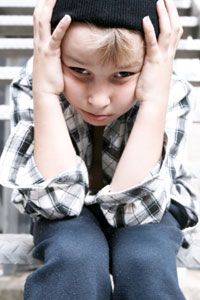Depression and its causes don't discriminate. Genetics, drug and alcohol abuse or even a bad run of luck in finances or personal relationships can spiral into a clinical case of the blues. Each year, nearly 7 percent of U.S. adults -- spanning all racial, ethnic and socio-economic groups -- suffer from Major Depressive Disorder (MDD), the chronic illness characterized by what medical professionals refer to as a "deep, all-encompassing" sadness. While depression often appears during a person's 20s, the disorder affects people of all ages, including children, teens and seniors.At least 10 percent of Americans will have a bout of MDD at some point in their lives [sources: Wishard Health Services, Levinson].
We all feel down in the dumps every now and then, but MDD (also referred to as clinical depression or simply depression) inhibits a person's ability to function over a period of weeks or more. In addition to profound sadness, it can include feelings of frustration, restlessness, irritability, a general loss of interest, low sex drive, appetite changes and sleeping problems [source: National Library of Medicine].
Advertisement
While depression's specific causes are unknown, there are certain physical and psychological factors believed to bring on the illness, all of which can often be traced back to one common source: family. Inherited traits, including hormone and neurotransmitter (chemicals that relay signals throughout the body) levels, for example, have long been considered possible causes of depression. Psychological sources, on the other hand, are often rooted in traumatic life events such as a major loss, emotional and physical neglect or sexual abuse that might be a product of the person's familial relationships [source: National Library of Medicine].
That leaves adopted people, whose inherited traits come from one set of parents and whose childhood and adolescence is shaped by another, in an interesting position when it comes to depression. Are adoptees at a higher risk of depression than those who are raised by their biological parents? Read on to find out.
Advertisement

